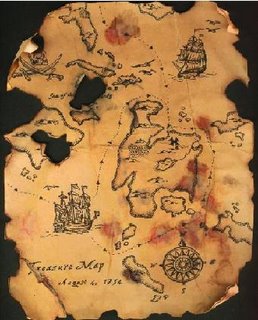
Evidently there is a treasure map in the Bible that humankind is supposed to solve. Treasure Map Hermeneutics views Scripture as some amazing compilation of information that is somehow given in code that we must decipher in order to truly understand things. While this approach seems especially true when it comes to end times, many people approach the Bible as if everything contained in it is written in some sort of secret code - if we can just piece the right verses together and get our charts right, then we'll understand this strangely complex book.
This lesser view of Scripture that has flooded the church borders on the "research" reported in The Bible Code, where computerized analysis "uncovered" hidden words in Scripture. (The same approach also found similarly hidden words in Moby Dick (a.k.a. "The Whale") and could be applied to any sizable text - it is simply a study in mathematics and probability.)
Such an approach seems to be in conflict with an 'authorial intent' approach to the Bible. Interestingly, though, it seems that those who place the most emphasis on Scripture and profess to hold a "high view of Scripture" are often (not always) the ones who also communicate such a system of finding answers "hidden" somewhere in these 66 books of the Bible. The Bible becomes a big treasure map with little clues hidden here and there that, when pieced together, provide answers.
However, for this Treasure Map approach to work then one must also conclude that the inidividual writers of the books of the Bible were very cunning in the way that they presented their material. Matthew must have been joking when he wrote "let the reader understand" in Mt 24.15. Similarly, in Mt 24.42-51 Jesus tells the disciples that they will neither know what day their Lord is coming nor will he come at the time of their prediction.
The disciples prompted the whole discussion in Mt 24 by asking Jesus some questions about the coming of the end. Similarly, it is not wrong for us to seek to rightly interpret Scripture and come to grasp the meaning of the text, and it is not wrong to want to understand the end times.
The doctrine of Scripture is weak in the church today, and I believe this is in large part due to the inconsistent hermeneutical approaches of our trained pastors and teachers. I often say that I believe that the most important class taught in seminary is Hermeneutics. Modeling hermeneutics for those we teach in any arena is as important as the content of what we teach. Without realizing it, we can turn the Bible back into Latin that only the elite few are able to interpret. Let us be careful.


No comments:
Post a Comment